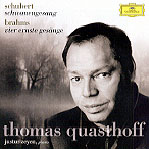Thomas Quasthoff’s fine account of Schubert’s Schwanengesang D. 957 joins a distinguished group of existing baritonal renderings of some of the composer’s darker, emotionally intense, and interpretively difficult songs. Classicstoday.com’s review archive contains two of the more notable–Dietrich Fischer-Dieskau’s EMI traversal (type Q3138 in Search Reviews) and a relatively recent offering from Michael Volle on Naxos (type Q707). Quasthoff’s rich-toned and warmly expressive voice fits right into the character and texture of many of these works, taking on just the right combinations of forcefulness and lyricism in the most dramatic selections–“Kriegers Ahnung” (Warrior’s Foreboding) and “In der Ferne” (Far Away), for example. The delivery perhaps isn’t as silky-smooth and effortless sounding as either of the above-mentioned singers, but it more than makes up for that in its sheer earnestness and sincerity.
Schubert’s at his best here in fashioning accompaniments that support the texts–either in the overtly characterized “rushing brooks” and “torrents” and “whispering breezes” or in more abstract suggestions of mood (“Warrior’s Foreboding”), and pianist Justus Zeyen is more than up to the not inconsiderable challenges of balance both within the piano parts and relative to the singer. Of course, Schubert didn’t intend these 14 songs as a cycle, nor did he give the set its title (a publisher did, after the composer’s death), but they all were written during the last year of his life and belong to no other group, so the collection makes a certain amount of sense even though it has no overarching structure or logic. However, when you hear Quasthoff perform these pieces, it’s so easy to just enjoy the voice and the drama in the interpretations, all governed by a commanding, confident technique, that the question of whether or not the songs should be sung together becomes moot.
And then come the four Brahms songs, which may never have been performed more knowingly, or with greater ease and naturalness in the integration of words and melody. There’s no over-dramatization or undue passion in the inflection–just what sounds like a consistent and deeply felt personal utterance. (Incidentally, Quasthoff’s affinity for Brahms is further exemplified in his earlier DG recording of rarely heard works, also reviewed here–type Q1217). Sonically, this disc is an example of what happens when everything goes right–singer and pianist are in ideal balance and the piano’s full range is reproduced with sparkling, clear high register notes and full-bodied bass (listen to the treble arpeggios contrasted with the rumbling low notes in “Die Stadt”, for example). Just when I start to wonder (and be grateful for) what motivates major record labels to continue to issue song recital recordings (how big could the audience for these things be?) I hear a disc like this one and hope that the answer has something to do with the eternal, uniquely communicative power of singer and song, and the inextinguishable inevitability of this fundamental form of music-making–forces that ensure a positive future for such projects. Wishful thinking? Perhaps–and just to be sure, you should snap this up as soon as possible! [8/18/2001]
































